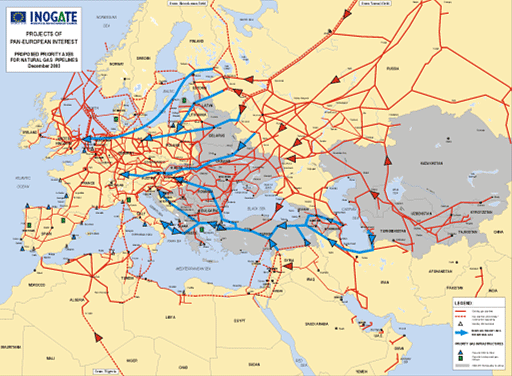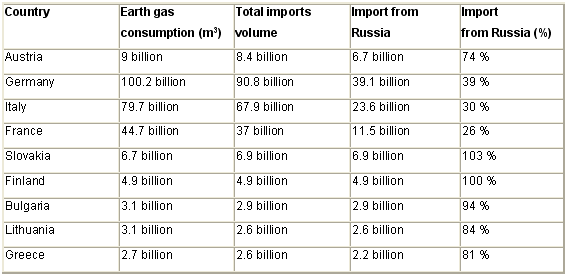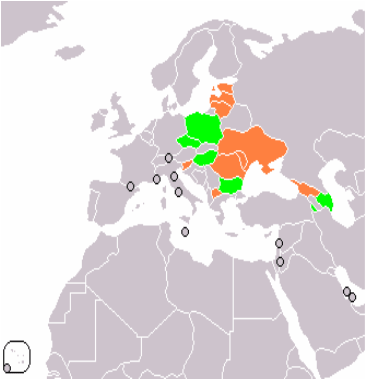Irrespective of its economic potential and political prospects, the European Union (EU) remains a weak geopolitical player with plenty of conflicting national interests and geostrategic priorities. These discrepancies cause that all European Council’s attempts to set a cohesive geopolitical course and joint foreign policy have failed. The EU cannot exist as a united suprastate whole without this. As long as it’s absent, one cannot speak of a state. Geopolitics means the position of a state in geographical and political room. According to F. Ratzel “state functions as an organism attached through a certain part to earth surface and its characteristics emerge from the characteristics of nation and soil.” (1) The state demonstrates its existence only if it identifies itself in terms of a room among other states and reflects itself in the thinking, feelings and desires of people. Of course, unless the community of united European states sets the aim of establishing a kind of new state, there’s no point in dealing with the question of European geopolitics.
The weakness of European geopolitics
Meanwhile, there’s a segment approach in European geopolitics which is marked by the existence of individual geopolitical approaches in individual states that aren’t in accordance with the objectives of entire community. From among the most important geopolitical players we may pick Germany, France and the United Kingdom. Whereas the former two states prefer Europocentric attitude and speak for active collaboration with Russia, the United Kingdom gives precedence to the North Atlantic Alliance (NATO) and adheres to the alliance with the US. In the case of Germany and France, or rather, their interests, Russia exerts its influence on these states with the aim of enfeebling US influence on continental Europe. Russian experts in the field of geopolitics call more and more for the establishment of a new geopolitical axis Moscow – Berlin – Paris. This resulted in geopolitical objections and demands of new EU member states in Central and Eastern Europe, which don’t trust “old” European sates as well as joint European policy very much and try to develop their own geopolitical orientations. The cause is their historical experience according to which the “old” Europe isn’t capable of applying for the role of a geopolitical leader on the continent and prefers “bad peace” to any political or geopolitical conflict.
This is exactly what the new EU member countries fear and owing to these fears they give precedence to a closer cooperation with the US. Thus they become the mediators of own geopolitical interests in EU itself as well as in terms of the relations with other European, mainly eastern, states that aren’t EU members. We may say that the EU has remained in the position of a geopolitical outsider for now. This problem has been confirmed by European analyst as well as US practitioners. “From the economic point of view, the European Union is a world power, however, from the political point of view, it isn’t that way. This is linked with the absence of joint foreign policy as well as a consensus among 25 members some of which have a long tradition of neutrality and pacifism. That’s the reason why the fulfilment of common geopolitical priorities is hardly feasible.” (2)
Zbigniew Brzezinski claims quite straightforwardly that the EU is just a geopolitical continuation of the US and we cannot expect that this is going to change: “Nowadays, regardless of its economic power and fundamental economic and financial integration, Europe has found itself in a US military protectorate.” (3) The establishment of European Rapid Reaction Force doesn’t represent a solution to this issue.
Geoenergy policy as a new form of geopolitics
Geopolitics, like politics, offers common interest which mobilises society and countries in favour of its attainment. At present, can we speak of the existence of possible scenarios as for European geopolitics? In our opinion, it is the economic priorities and not the political ones that form a basis for European geopolitics.
In the foreground is energy security which affects the interests of all EU members in diverse ways. It’s possible that joint European geoenergy strategy originates right in terms of the discussion on energy security questions. The statements of a wide range of top EU representatives attest to it. On 10th January, 2007, the European Commission adopted the decision on a new European energy policy according to which “energy issues were supposed to become the central part of the external relations of the EU.” In March 2007, the European Council endorsed a two year action plan (2007 – 2009) for the extension and reinforcement of EU energy relations (4). Former Dutch Foreign Affairs Minister Jozias Van Aartsen emphasised in his statement dated 7th April, 2008, that EU energy policy had to become the basis for European geopolitics. “New policy is supposed to go beyond EU borders towards Southeast Europe, Caucasus the Middle East and North Africa. The goal of such a policy is not only to forge links between the EU and the majority of energy material suppliers in the region, but also to develop the policy on long-term energy security and to uphold industrially developed economic expansion as well as political stability in partner states.” (5)
Picture 1. INOGATE – Project on the ensuring of earth gas supplies for the EU.

Source: European Commission
With regard to the discussion on the formation of European geopolitical room in present world we have been encountering a new kind of geopolitics, namely geoenergy policy. In its case national, state and ideological priorities of individual nations were replaced by economic and energy interests which are marked by a more pragmatic attitude to reality.
The EU will be in reality fully dependent on external energy suppliers in the future. The consequence will be that the economy of united Europe as well as political stability will become a hostage of moods of other states whose regimes are by no means democratic. This applies particularly to the Middle East and Russia. According to the Green Paper Commission the energy dependence of the EU will only grow during next years. Even today, 45 per cent of oil supplies come from the Middle East states and unless the situation changes, in 2030, 90 per cent of oil consumption in the EU will be secured by means of imports. The same holds true for earth gas. Nowadays, 40 per cent of consumption are imported from Russia, further 30 per cent from Algeria and 25 per cent from Norway. In 2030, the EU will import 60 per cent of gas from the Russian Federation and overall imports will account for 80 per cent of total consumption.
Also coal exports will be increased amounting to 66 per cent of overall consumption in 2030. These data aren’t definite and they are very likely to rise further considering the dynamic economic development of new EU member sates. Such a situation forces central institutions of the EU as well as the governments of member countries to conduct a joint energy security strategy which is sure to be connected with the definition of the priorities and stances of the EU as a whole. When speaking of energy security, the situation seems more or less clear. The primary tasks of the EU are:
– energy market diversification;
– equal access to energy sources to all EU members;
– the search for alternative energy sources.
Geoenergy questions are much more diversified and require balanced approach. The field of geoenergy policy contains following segments:
1. The definition of strategically important courses from the viewpoint of EU’s interests and main partners;
2. The stepping up of EU’s influence in particular regions and states which supply energy materials, the ensuring of permanent presence in the given regions and political as well as economic attachment of the states in question to the EU;
3. The creation of conditions and the support of democratisation processes in the so-called Third World countries with the aim of enabling their opening to European economy, the separation of these countries from stronger geopolitical rivals like Russia;
4. The securing of internal economic and political stability in regions which supply energy materials to the EU;
5. The search for geopolitical and political compromise with large, however, non-democratic states, Russia in particular. The EU has succeeded predominantly in the realisation of this point.
The choice of strategically crucial courses within EU geoenergy policy is under way in accordance with the principle of energy material supply. From among priority courses we may earmark the Russian, or rather, the East European vector, the Middle East one and the Mediterranean one.
Russian vector
As I have already mentioned, Russia is the most important earth gas supplier to EU states. Many of EU members, primarily the states of Central and Eastern Europe, are fully dependent on the mentioned supplies.
Chart 1. The volume of gas supply from the Russian Federation to individual European states

Source: Otkuda prichodit v Evropu gaz. BBC, 4th January, 2006.
http://news.bbc.co.uk/hi/russian/business/newsid_4580000/4580630.stm
Mutual relations between the EU and Russia are the subject mater of various evaluations of individual EU members. Originating internal conflict correspond exactly to borders between „new” and „old” EU members. „Old members” like Germany, Italy and France are prepared for geopolitical compromise with Russia and willing not to interfere with the zone of Russian geopolitical interests with the aim of avoiding energy conflicts. Therefore some former USSR states are traditionally perceived as a part of Russia (6). Projects, the goal of which is the entry of the mentioned countries into political blocs and alternative integrations with Russia, are blocked. This pertains, for example, to Ukraine and Georgia, which declared their interest in NATO entry. However, these attempts were hampered by France and Germany. The internal disunity of the EU has been manifested also by the conclusion of an agreement between Germany and Russia on the construction of the Nord Stream gas pipeline on the seabed of the Baltic Sea which harms the interests of Poland and Baltic states. Russia is active also in the southern part of European continent. It started to build the South Stream gas pipeline there. This may subsequently affect political decision-making processes. In this case the European Union doesn’t act as a geopolitical subject, but it turns into an object of Russian geopolitics.
Picture 2. Community of Democratic Choice (orange – member states, green – observers)

Consensual policy of several EU member states in terms of the relations to Russia led to the origin of “minor” geopolitical alternatives whose initiators became the countries of Central and Eastern Europe, i.e. the former Soviet bloc members. Among them are, for instance, the Eastern Partnership and the Community of Democratic Choice. Similar projects haven’t got exclusively geopolitical character. Their objective is rather the solution to concrete political goals, for example, the support and development of democracy in the region. The Community of Democratic Choice was founded to this end in 2005 (See picture No. 2). It’s comprised of nine states of Eastern Europe and Southern Caucasus five of which are EU members (Lithuania, Latvia, Estonia, Slovenia and Romania). In spite of this, regional attempts of individual states to pursue own policy confirm repeatedly the weakness of common EU institutions as for the formation of united geopolitical doctrine with relation to Russia and other states of Eastern Europe.
Nevertheless, one has to highlight that the EU plays its energy game in the region of the Black and Caspian Sea. This region stands for one of the priorities within geoenergy policy. Azerbaijan and Kazakhstan are among strategic partners of the EU in this region.
In 2005, the oil pipeline Baku – Tbilisi – Ceyhan, which transports oil from Azerbaijan through Georgia to Turkey and further to Europe, was put into operation. Its aim was to solve two crucial tasks.
First of all its aim is to establish a stable and independent European energy market in relation to the Middle East. Another task is to push Russia out of the region. That’s why the EU turns a blind eye to violating democratic principles and human rights in Azerbaijan, Georgia and Kazakhstan. Thus Azerbaijani President Ilhan Aliyev, whose rule is more than dubious from the point of view of democracy, has a positive image in Europe. In the period 2001 – 2003, he presided over the delegation of Azerbaijani National Assembly (Milli Maclis) in the Parliamentary Assembly of the Council of Europe (PACE). In 2003, he was even elected the Chairperson of the PACE. In April 2004, he was granted the honorary title of PACE Member and awarded the PACE medal for active participation in the work for PACE and loyalty to European values. Thus the region of Caucasus and the Black Sea is an instance how geostrategic and economic interests overshadow gradually the political ones.
Apart from the already mentioned oil pipeline also the South Caucasus one leading from Azerbaijan to Turkey has been utilised in the region. The European Union plans to import gas via the Nabucco gas pipeline, or rather, via the Turkish-Greek and Greek-Italian gas pipeline.
One of the most extensive projects in the region could be the construction of the so-called Transcaspian gas pipeline, which would enable the interconnection of Turkmenistan, Kazakhstan, Azerbaijan, Georgia and Ukraine and European energy market. However, the unforeseen death of Saparmurat Nijazov and the conclusion of a new agreement between Russia, Turkmenistan and Kazakhstan in 2007 have, in all probability, made this project impossible. In accordance with a new Russian-Kazakh-Turkmen agreement, which was signed by new President Gurbanguly Berdimuhammedov on behalf of Turkmenistan, Turkmen gas will be exported through the reconstructed Central Asian gas pipeline system controlled by Gazprom.
The Middle East vector
Further strategic course from the viewpoint of the EU is the Middle East. The EU strives to take centre stage in political and economic processes in the Middle East. One of the spheres in which the EU could present itself as a powerful international structure is the settlement of military conflicts and the stabilisation of internal political situation, for example, in Iraq. The European Commission at the same time signed a package of bilateral contracts with six countries of the Persian Gulf, the members of the Cooperation Council for the Arabic States of the Gulf. The contracts pertain to the questions of free trade among the countries. Anyway, of greater moment is that practically all member states of the organisation are simultaneously members of the Organisation of the Petroleum Exporting Countries (OPEC). Irrespective of this fact, the EU is perceived as an economic, not a political, power in the Middle East region. Political power still rests with the US and is exerted in terms of NATO. It cannot be ruled out that if the US admits the failure of their effort to assume control over Iraq, the EU will become a new power in the region.
Mediterranean vector
One of the primary geoenergy and foreign political courses is the Mediterranean region, which has always been in the sphere of EU’s special interest in accordance with traditions. The process of close regional cooperation and the establishment of the Euro-Mediterranean Partnership were initiated in Barcelona yet in 1995. All EU member states along with ten countries of the south coast of the Mediterranean Sea (Algeria, Egypt, Israel, Libya, Morocco, Palestinian Autonomy, Syria, Tunisia and Turkey) have been currently the participants of the agreement on Mediterranean Union. The partnership enables the establishment of a free trade zone by 2010 and opens markets for goods from the EU. One has to point out that the integration of several Arab states and Israel into the partnership attests to EU’s ambitions to become a political arbiter of intricate regional conflict solution (7).
From the viewpoint of energy materials supply, Algeria is enormously important for the EU. The European Commission assumes that access to Algerian earth gas sources manages to diminish EU’s dependence on Russian supplies. In 2007, several agreements were concluded. These enabled the EU to gain access to Algerian gas. Also a gas pipeline construction project interlinking Algeria and Europe was endorsed.
The European Union tries to make from the entire African continent a zone of own interests. This effort is connected with the traditional “feeling of guilt” that springs out from European colonisers’ activities and the fact that Africa represents a huge market with potential for the export of European products, but also a source of raw materials. The EU adopted a special document called “EU Strategy for Africa. Towards a Euro-African pact to accelerate Africa’s development” in 2005. The EU believes that one of the mechanisms for expanding its influence on the continent is the development of this continent. That was the reason why the EU earmarked as many as 85 billion euro for African countries in 2003. In 1985, this aid accounted for only 5 billion euro. After the end of the Cold War and the dissolution of the USSR, Africa remained a forgotten continent suffering from a good deal of military conflicts. The European Union proposes African countries not just an ideological assistance, but a real economic one. Most probably, Africa will become one of the primary strategic objects of European geopolitics within a short space of time.
Collaborating with African states, the EU obtains also real advantages in the form of access to energy sources in countries like Nigeria and Angola as well as in other countries united in Economic Community of West African States (ECOWAS).
Conclusion
There is a prospect of success in European geopolitics, however, determination and political will are prerequisites for it. Today, the EU has basically two real geopolitical and political rivals, namely Russia and China. These rivals act determinedly and ignore the principles of freedom and democracy. They’re ready to cooperate with anyone, even with the most odious regimes in Africa and Asia. The European Union has a considerable economic potential, but if this isn’t put into practice through concrete geopolitical, i.e. not only economic, projects for the foreseeable future, the EU may find itself in a kind of geopolitical isolation and lose any initiative on the international scene. Thus it will shut itself away in the existent framework of 27 member states.
1) Ratzel, Friedrich: Politische Geographie. 1887, Einleitung.
2) The Geopolitics of the European Union Bilderberg Conference (Stresa, 3-6 July 2004))
3) Brzezinski, Zbigniew: The Geostrategic Triad: living with China, Europe, and Russia.
4) Geopolitics of EU energy supply.
http://www.euractiv.com/en/energy/geopolitics-eu-energy-supply/article-142665
5) Why energy must be at the core of EU security thinking.
http://www.euractiv.com/en/energy/energy-core-eu-security-thinking/article-171378
6) Nekrašas, Evaldas: Lithuanian Foreign Policy: Concepts, Achievements and Predicaments. Lithuanian Foreign Policy Review, 2004, № 1-2, р. – 34.

